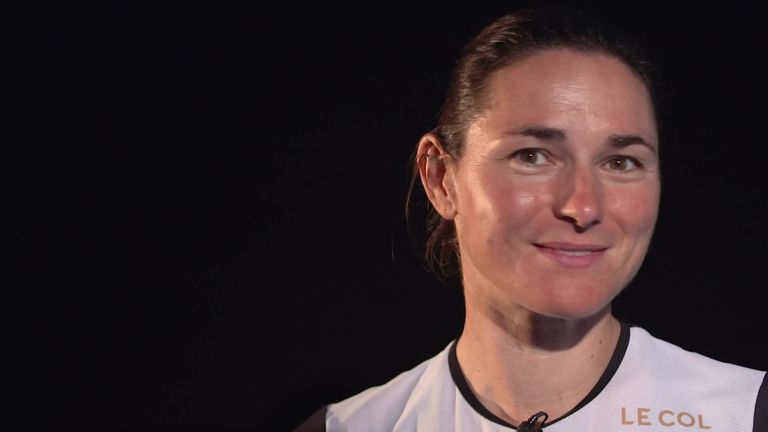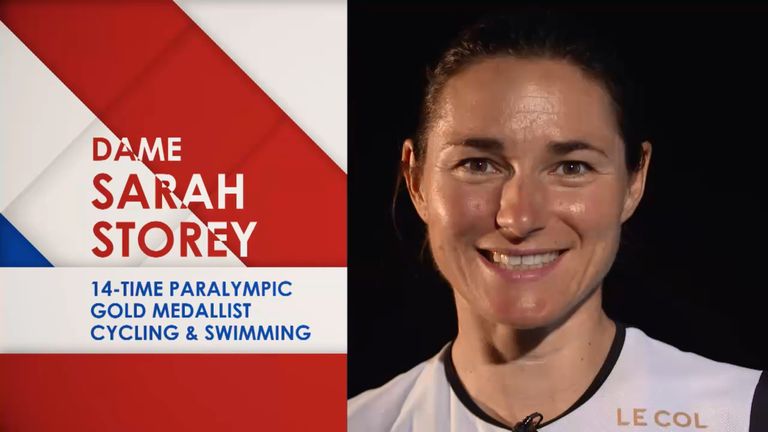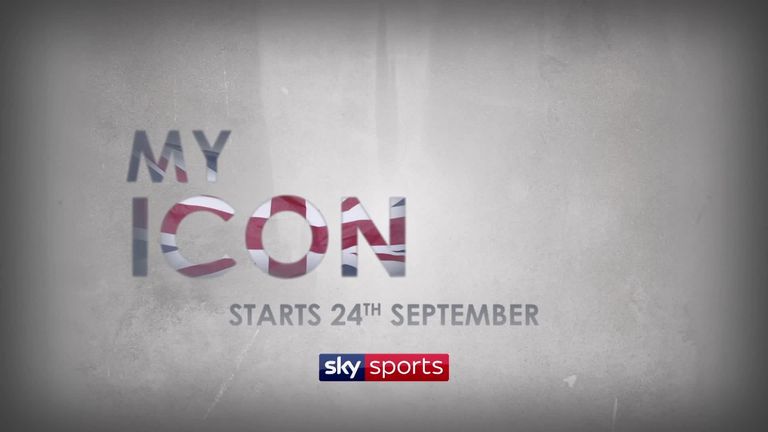Dame Sarah Storey tells My Icon who inspired her to Paralympics success
Watch Dame Sarah Storey in the new series of My Icon, showing on Wednesday at 6pm on Sky Sports Mix (Sky channel 121). All episodes of My Icon are available On Demand
Wednesday 26 September 2018 13:18, UK
Sarah Storey was just six years old when the swimmer who would become her inspiration starred for Great Britain as a teenager at the 1984 Olympics in Los Angeles - and she was called Sarah too.
Now Dame Sarah Storey - and Britain's most decorated female Paralympian - she spoke to Sky Sports for the new series of My Icon, returning to our screens to mark National Inclusion Week.
So who was the young sensation in '84? "Sarah Hardcastle - she was a very driven individual, very focused and was able to work by herself so effectively," says Storey.
"I just loved the way that she had this strength and work ethic. I watched a little documentary about her and everything that she was doing and the way that she described things really resonated with me. I loved watching her swim."
Hardcastle claimed silver in the 400m freestyle in LA and remains the youngest British woman to have ever won an Olympic medal.
Over 30 years later, Storey has 14 Paralympic gold medals to her name - five in swimming and nine in cycling - as well as 31 world titles. It's difficult for her to pick just one career highlight.
"Some of the highlights are things that people haven't perhaps even seen - the things that you've done that are not in front of the TV cameras," she says.
"Winning jerseys in the Tour of California [the annual road cycling race] was really special, just because it was something I'd done with my very own team that I'd created - but you have to look at the Paralympic gold medals."
Switching sports
Storey reflects on her decision to switch sports from swimming to cycling when she was 27.
"I was probably one of the first athletes that went through a talent transfer programme, although it wasn't particularly a programme at the time - it was more of a happy coincidence!
"I started racing in a different sport, and it was pretty successful. I won gold medals at the European Championships and broke a world record on a bike, and was then offered a place on the British cycling programme."
Storey began her Paralympic journey in Barcelona in 1992 as a 14-year-old swimmer, that being the sport that she says 'first chose her' at international level.
Immediately she made her mark, beating Claudia Hengst from Germany - who at the time was unbeaten - not once but twice, and setting a time in the 200m that was still highly competitive 20 years later.
She left her first Games with two golds, three silvers and a bronze and in Atlanta four years later, she continued to prosper, adding three more gold medals, another silver and another bronze to her already impressive tally.
After competing in Sydney and Athens, 2005 signalled a switch in focus for her as she swapped the pool for the velodrome.
"When you switch sports, you don't have any expectations," says Storey. "But to come into cycling - and to have the record I have now of being unbeaten in certain events over the past 13 years - is something that I kind of pinch myself about, because I do feel like I'm in a bonus career. I'm actually better at cycling than I was at swimming.
"There's nine Paralympic golds in cycling, and each one of them has a story like the swimming ones do. Winning in front of a home crowd in London was incredible, but also winning with my three-year-old daughter in the stands in Rio... I was over the moon."
Perception and profile
Whilst her Paralympic achievements have been seen by many live around the world, she can say with certainty that none of her 31 world titles have been live on television.
"London 2012 did a huge amount for the perception of disability sport - it put it on the map," she explains. "There's certainly a huge amount more coverage of disability sport in the media, but there's still a lot more that can be done.
"I think that's a stat that I would love to see change, and maybe in the next 25 years, there'll be a different Sarah Storey sat in front of you saying 'every single one of my 31 titles has been covered live on television'.
"I think we've seen changes in attitude. We are still waiting to see the complete changes to the way things are publicised, to the profile, and also how that trickles through to grassroots, and some of the barriers that there are to getting into disability sport and being included within an able-bodied club because you're the only one with an impairment.
"Those things can still be improved upon hugely. We haven't yet got the right profile of disability sport."
According to Storey, it is not just in para-sport that she can see room for growth - there are wider issues at play.
"It's interesting because in cycling, we have the same challenge within women's cycling," she adds. "It's not up to speed with where the men's cycling is. A lot of the men's pro-cycling teams don't have women's teams.
"We look across at football and there is a similar kind of scenario. Women's football is growing and para-sport is kind of another level down from that, in terms of development.
"But we're a very young sport, para-sport. We have to expect that we will grow gradually but obviously in terms of TV coverage and media coverage, we'd like to see that happen a little bit quicker."
Becoming a role model
Whether it be in swimming or cycling, after such a successful career Storey is now not only one of Britain's most successful athletes, she is also a role model to many young people - just like Hardcastle was to her.
"When somebody tells you that you're a sporting icon or hero, it feels like they are talking about somebody else," she says.
"You never really look back a huge amount as an athlete so when somebody reads out an introduction when you're going to an awards ceremony, you suddenly realise just how many medals are stowed away at home somewhere.
"It's a huge privilege. You can't apply for a title like that, for the job of being a role model. If somebody says you're their role model, it's hugely humbling.
"I'm fortunate to have done everything I've done and to be seen as a sporting hero to people."
Don't miss Dame Sarah Storey on the latest series of My Icon on Wednesday - All My Icon episodes are also available On Demand.









